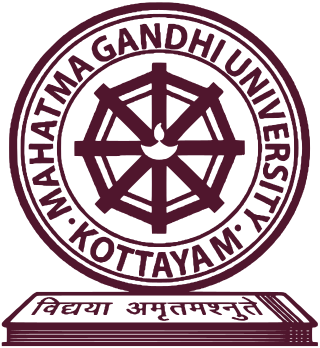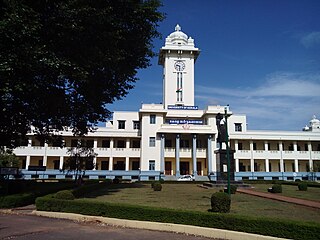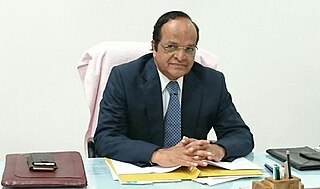Related Research Articles

Gandhism is a body of ideas that describes the inspiration, vision, and the life work of Mohandas K. Gandhi. It is particularly associated with his contributions to the idea of nonviolent resistance, sometimes also called civil resistance.

Mahatma Gandhi University (MGU), commonly referred to as MG University, is a state owned public university headquartered in Kottayam in the state of Kerala, India. It was established on 2 October 1983 on Gandhi Jayanti day. Mahatma Gandhi University has been approved by University Grants Commission (UGC) and accredited (A) by the National Assessment and Accreditation Council of India. The university has around 300 affiliated colleges spread over five districts in central Kerala.
Pravasi Bharatiya Divas is a celebratory day observed on 9 January by the Republic of India to mark the contribution of the Overseas Indian community towards the development of India. The day commemorates the return of Mahatma Gandhi from South Africa to Mumbai on 9 January 1915.

Gopinath Muthukad is an Indian magician and motivational speaker from Kerala. He employs magic as a medium to convey his messages to public. Muthukad founded the world's first magic academy, The Academy of Magical Sciences, and first magic museum, Magic Planet at Thiruvananthapuram.

Manibhai Bhimbhai Desai was an Indian social activist, associate of Mahatma Gandhi, and a pioneer of rural development.
Gandhian socialism is the branch of socialism based on the national interpretation of the theories of Mahatma Gandhi. Gandhian socialism generally centers on Hind Swaraj or Indian Home Rule authored by Gandhi.
Gandhian economics is a school of economic thought based on the spiritual and socio-economic principles expounded by Indian leader Mahatma Gandhi. It is largely characterised by rejection of the concept of the human being as a rational actor always seeking to maximize material self-interest that underlies classical economic thinking. Where Western economic systems were based on what he called the “multiplication of wants,” Gandhi felt that this was both unsustainable and devastating to the human spirit. His model, by contrast, aimed at the fulfillment of needs – including the need for meaning and community. As a school of economics the resulting model contained elements of protectionism, nationalism, adherence to the principles and objectives of nonviolence and a rejection of class war in favor of socio-economic harmony. Gandhi's economic ideas also aim to promote spiritual development and harmony with a rejection of materialism. The term "Gandhian economics" was coined by J. C. Kumarappa, a close supporter of Gandhi.

The importance and antiquity of education in Kerala are underscored by the state's ranking as among the most literate in the country. The educational transformation of Kerala was triggered by the efforts of the Church Mission Society missionaries, who were the pioneers that promoted mass education in Kerala, in the early decades of the 19th century. The local dynastic precursors of modern-day Kerala—primarily the Travancore Royal Family, the Nair Service Society, Sree Narayana Dharma Paripalana Yogam and Muslim Educational Society (MES)—also made significant contribution to the progress on education in Kerala. Local schools were known by the general word kalaris, some of which taught martial arts, but other village schools run by Ezhuthachans were for imparting general education. Christian missionaries and British rule brought the modern school education system to Kerala. Ezhuthu palli was the name used in earlier times. The word was derived from the schools run by the Buddhist monasteries. For centuries villages used to set up an ezhuthupally or ashan pallikoodam with one or two teachers. Students used to go this school from nearby areas and learn languages, literature, mathematics, grammar etc. After completing this students may continue study about specific subjects such as ayurveda, astrology, accounting etc. Censuses during 1800 shows that Travancore, Cochin, Kannur areas have many such schools. Even name list of ashans were used to be published along with the census.

V. N. Rajasekharan Pillai is the vice-chancellor of Somaiya Vidyavihar University and provost of Somaiya Vidyavihar, Pillai concurrently serving as the chancellor of the ICFAI University, Tripura. He was president of Mewar University, Chiittorgarh, Rajasthan, India (2016–2018).

Nai Talim, or Basic Education, is a principle which states that knowledge and work are not separate. Mahatma Gandhi promoted an educational curriculum with the same name based on this pedagogical principle.

Ravindra Kumar is a Political Scientist, Peace Educator, an Indologist, a Humanist, Cultural Anthropologist and a former Vice-Chancellor of CCS University, Meerut (India).

Below Poverty Line is a benchmark used by the government of India to indicate economic disadvantage and to identify individuals and households in need of government assistance and aid. It is determined using various parameters which vary from state to state and within states. The present criteria are based on a survey conducted in 2002. Going into a survey due for a decade, India's central government is undecided on criteria to identify families below poverty line.
Mitraniketan K. Viswanathan was an Indian social reformer, philanthropist, and environmentalist in Kerala, India. He founded Mitraniketan, a non governmental organization in Vellanadu, Thiruvananthapuram, in 1956.

Kurian John Melamparambil is an Indian philanthropist, industrialist and writer from Kerala. He is the founder and chief promoter of Melam Group of Companies and the Melam Foundation. With his own generated funds, he has provided free medical treatment to over 158,000 poor patients through 1050 hospitals. He was honoured by the Government of India, in 2010, for his services to the social cause, with the fourth highest civilian award, the Padma Shri.

Bharata Mata College (Autonomous), Thrikkakara is an institution of higher education, located in Thrikkakara, Kochi, in the south Indian state of Kerala. The college is affiliated to Mahatma Gandhi University and offers 17 undergraduate, 6 post-graduate and 2 professional programmes. The main campus also houses four research centres in Chemistry, Mathematics and Commerce and operates as the offcampus centre for the School of Distance Education of the Mahatma Gandhi University. It holds an A+ grade accredited by National Assessment and Accreditation Council (NAAC) since 2019.
Padmanabhan Gopinathan is an Indian master weaver of handloom textiles and the founder of Eco Tex Handloom Consortium, an organization promoting handloom weaving in Manjavilakom, a small hamlet in Thiruvananthapuram, in the south Indian state of Kerala. Under the aegis of the organization, he provides employment to over 1800 women in the village. The Government of India awarded him the fourth highest civilian honour of the Padma Shri, in 2007, for his social commitment and his contributions to the art of weaving.
Padmanabha Pillai Gopinathan Nair was an Indian social worker, Gandhian, independence activist, and the chairman of Mahatma Gandhi National Memorial Trust. He participated in the Quit India movement of 1942 and worked alongside Vinoba Bhave to promote Bhoodan and Gramdan movements. He was the initiator of the camp movement, a student program that was part of the Construction Movement of Mahatma Gandhi. He was a recipient of the Jamnalal Bajaj Award, among other honors. The Government of India awarded him the fourth highest civilian honour of the Padma Shri, in 2016, for his contributions to society.
Smart Village is a concept adopted by national, state and local governments of India, as an initiative focused on holistic rural development, derived from Mahatma Gandhi's vision of Adarsh Gram and Swaraj. Prime Minister Narendra Modi launched Sansad Adarsh Gram Yojana (SAGY) or SAANJHI) on 2 October 2014, Gandhi's birthday, in addition to Smart Cities and Digital India, as a development programme for India. The Parliamentarian's Model Village Scheme main goal is for each Member of Parliament and Minister to adopt a rural village and develop it into a model by 2019 under the SAGY guidelines. The vision of SAGY is an integrated village development plan, encompassing Personal, Human, Social, and Economic dimensions.

AROH Foundation is an Indian national-level non-governmental organization founded in 2001 by Neelam Gupta. It is an organization working for underprivileged communities through sustainable development. AROH Foundation's prime focus is in the fields of education, health, sanitation, livelihood, natural resource management, and renewable energy.

Dr. M.S. Sunil is an Indian Academician, Humanist and Philanthropist known for housing the homeless. She founded Dr. M.S. Sunil Foundation in December, 2016 in Pathanamthitta, with five trust members and six volunteers. Her works focuses to uplift the living conditions of impoverished families/ communities, her philanthropist and non- profit programmes aim to provide safe houses and healthy food to build a compassionate environment with enlightened mind on renewable energy and conservation of natural habitat by including every communities including Tribal and socially underprivileged with less or no inequality. She was acknowledged by the Government of India and was the recipient of many honours, including the Nari Shakti Puraskar- 2017 which is considered as the Government of India's highest civilian honour for women.